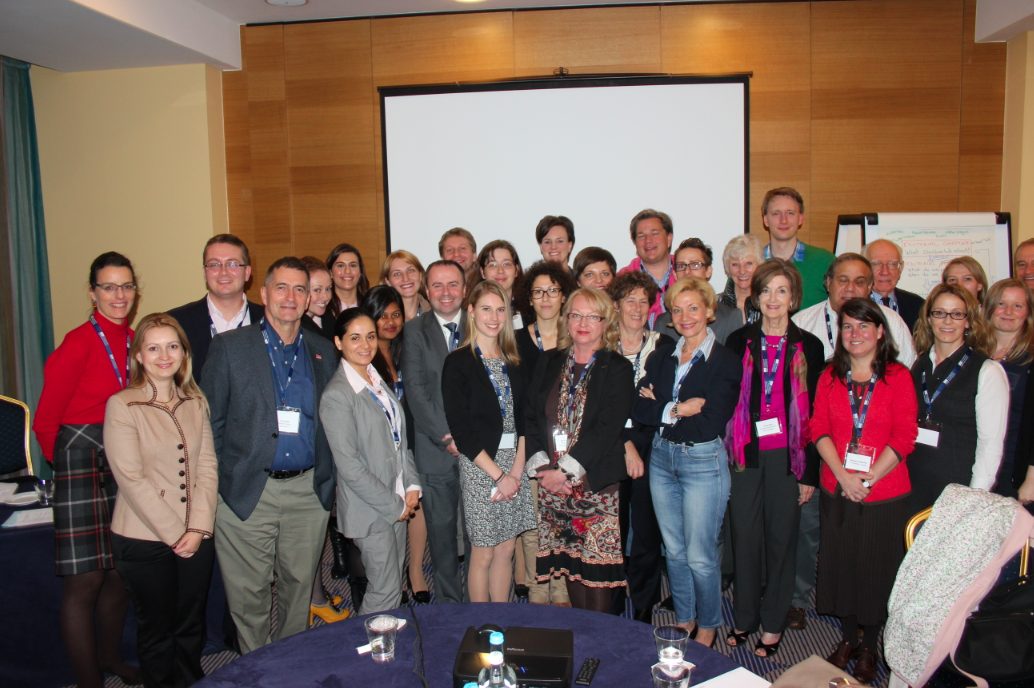Fulbright alumni leaders, Commission staff and US Embassy alumni coordinators from across Europe, along with State Department staff and leaders from the US Fulbright Association, gathered in London on October 18th last to share experiences, explore possibilities for future cooperation, and draft what is termed a ‘London Accord’ aimed at strengthening connections between European Fulbright alumni associations.
With 30 participants plus facilitators, the day’s deliberations began with introductions from all present and brief presentations on three umbrella organisations: the US Fulbright Association, the Office of Alumni Affairs at the State Department, and the European Network of American Alumni Associations (ENAM). Megan Huber, of the Office of Alumni Affairs, presented on the supports available from her office for both alumni coordinators and leaders and on the redesigned State Alumni website (https://alumni.state.gov), which is to be launched in the near future.
There followed breakout sessions to share experiences and practices in three areas prioritised in advance by those attending: membership development; use of social media; and shared access to job, internship and grant postings. In addition, US Embassy alumni coordinators convened as a separate group to share experiences and practices, all the more as theirs is a relatively new role. In terms of output, the membership development group focused on issues to do with: identifying the membership pool; member recruitment, notably of younger Fulbrighters; funding; institutional supports; and the value proposition (i.e., what the association offers its members).
When it came to shared access to job, internship and grant postings, participants considered that the redesigned State Alumni website will fill that need. On social media, we were fortunate to be able to tap into the expertise of Faten Saleh, a board member of the French Fulbright Alumni Association. She noted that it is best to focus effort on a single social media platform, with Facebook currently deemed to offer the most potential. She observed that it is important to have a community manager responsible or populating the Facebook page, with stories coming from the Board, from members and from linking to the pages of the local Commission, the local US Embassy, other alumni associations, and the State Department.
The feedback from the alumni coordinators pointed to the variation in experiences across Europe, where some embassies have dedicated coordinators, while for others the role has yet to be fully developed. Communication emerged as an issue, both between coordinators and with alumni associations and the Office of Alumni Affairs. It was recommended that alumni coordinators and alumni leaders establish robust communication channels, that experienced alumni leaders be tapped to mentor newly forming associations, and that the Office of Alumni Affairs facilitate strengthening connections between all our organisations through, for example, funding regular gatherings of leaders and coordinators to share best practices. All in all, the gathering proved very positive and fruitful, and an excellent step in the direction of stronger connections for mutual benefit.
Thanks must go to Wiltrud Hammelstein (of both the French and German Fulbright Alumni Associations), Daniela Schilling-Muehl (the Alumni Coordinator at the US Embassy in Berlin) and Michael Scott-Kline (Programme Director at the UK Fulbright Commission) for their vision and leadership in organising the meeting. Thanks must also go to the UK Fulbright Commission for sponsoring the meeting (venue and hospitality).
By Paul Donnelly
President, Irish Fulbright Alumni Association
Board Member, Ireland United States Alumni Association
Photo caption: Participants at the Fulbright alumni meeting in London (photo courtesy of Wiltrud Hammelstein).

